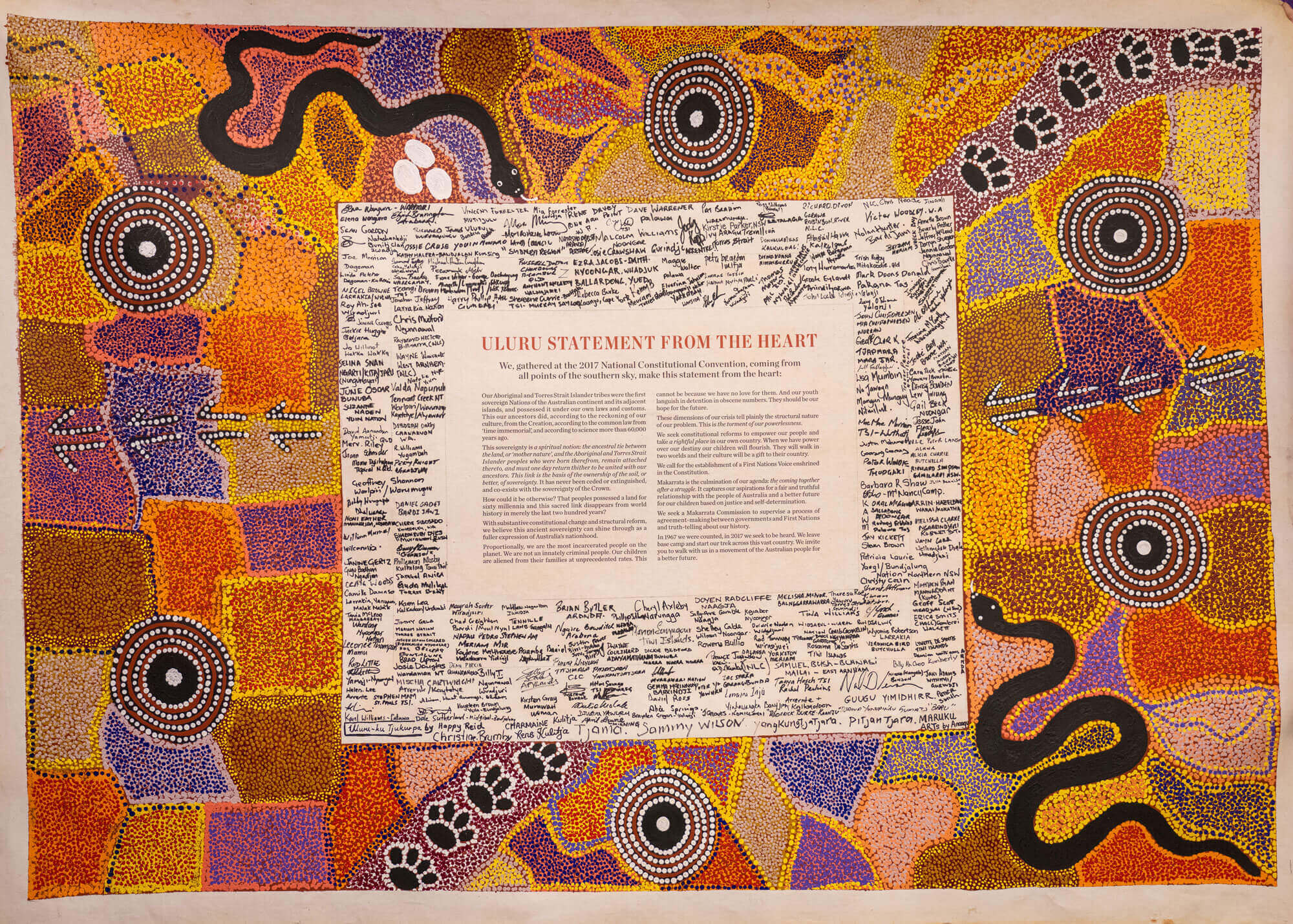The Australian Institute of Architects unequivocally supports the Uluru Statement from the Heart.
The Statement is an invitation to the broader Australian population to create a better future and proposes some key reforms.
The Statement calls for three actions of Voice, Treaty and Truth addressed as follows in the Statement:
- Voice: We call for the establishment of a First Nations Voice enshrined in the Constitution.
- Treaty and Truth: We seek a Makarrata Commission to supervise a process of agreements between governments and First Nations, and truth telling about our history.
The Institute supports Constitutional Recognition and the Voice to Parliament in the upcoming referendum.
We recognise that Constitutional Recognition of First Nations peoples is the right and just thing to do and is a critical step in righting many of the past wrongs that are deeply entrenched in our history.

We advocate a Voice to Parliament as a critical first step to achieving reconciliation that reflects a truly Australian democracy and upholds First Nations self-determination.
The question of supporting The Voice is not a political one – it is a principles-based question.
Advocating the Yes vote in the referendum is fully supported by the Indigenous leadership within the Institute and is fully supported by the Board and National Council of the Institute.
The Institute’s support of the Voice is consistent with actions the Institute has taken in recent years and an important part of the reconciliation process. It is a natural and just way to proceed and will be transformational in the introduction of shared and well-informed decision making about programs that affect First Nations people.
The Institute’s constitution contains a statement of recognition:
The Royal Australian Institute of Architects recognises the unceded sovereign lands and rights of Aboriginal and Torres Strait Island peoples as the First Peoples of these lands and waters.
This recognition generates acknowledgement and respect for Aboriginal and Torres Strait Islander Countries, Cultures and Communities, and their ways of being, knowing and doing.
Caring for Country practices including architecture and place shaping have existed on this continent since time immemorial.
The Institute recognises a professional commitment to engage and act meaningfully through reciprocal partnership and relationships with Aboriginal and Torres Strait Islander peoples.
Together we will support and develop the emergence of new possibilities for our shared future.
We have permanently enshrined a voice within the Institute’s governance structure through the First Nations Advisory Committee.
We have integrated a range of actions in our 2021-2023 Strategic plan, including:
- Leading by example on respectful relations with First Nations Peoples.
- Aligning policy and advocacy approaches with First Nations values and priorities.
- Working to anticipate members needs and deliver guidance and support to the profession on responsibilities to First Nations Peoples.
Our Indigenous members and others are actively sharing knowledge of working with Country and First Nations engagement through our continuing professional development program.
The referendum on an Indigenous Voice to Parliament will be an historic once-in-a-generation event. There will be ongoing discussion and debate, and diverse opinions and disagreements. We understand and respect that not everyone will support the Institute’s position. As a democratic society, people are free to form their own views and inform themselves of the issues. Whether or not people choose to vote in favour of the Voice is a matter for each individual.
We encourage members to take the time to inform themselves about the issue and stand with the Institute in support of the Constitutional Recognition and the Voice to Parliament in the upcoming referendum.
This statement is endorsed by the Institute’s First Nations Advisory Committee (FNAC). The Committee’s co-chairs, Sarah Lynn Rees and Paul Memmott led a consultation process with its 14 Committee and Cultural Reference Panel members. This also involved the Committee’s Indigenous Researcher who carefully read, reviewed and disseminated a selected range of published arguments about the proposed Referendum, both positive and negative views, for the members’ consideration, and then prepared a summary list of points eliciting the ‘For’ and ‘Against’ cases.
After deliberation, the FNAC members came to a consensus and decided in unison to support the ‘For’ case, and assisted Institute staff to draft this position statement to present to the Board and then the National Council of the Institute who have both similarly supported the ‘Yes’ case in the forthcoming National Referendum.